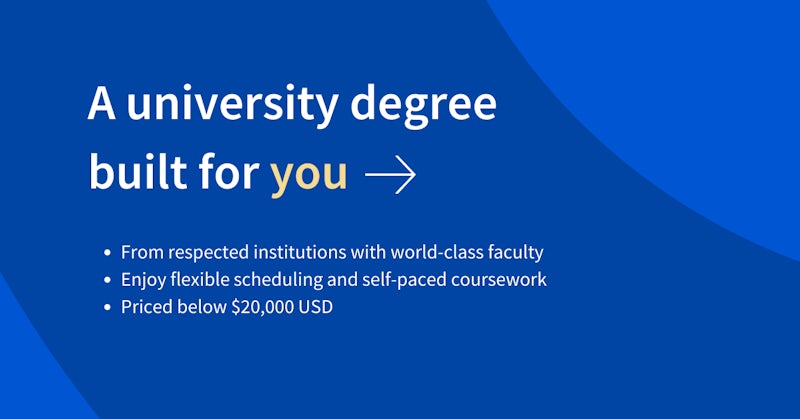![[Featured Image] A young man sits at a laptop in a required class for his computer science degree.](https://images.ctfassets.net/wp1lcwdav1p1/38jhyGvZbkr7Dapb5aqYOW/f9df28b63a15175ba5682fd283494aa6/GettyImages-513633874.jpg?w=330&h=216&q=60&fit=fill&f=faces&fm=jpg&fl=progressive)
What Classes Are Required for a Computer Science Degree?
As the digital age continues to evolve, the pursuit of a computer science degree has become synonymous with a passport to opportunity. Learn more about what classes are required for a computer science degree.
January 29, 2025
Article

![[Featured Image] A young man uses his laptop to learn about stackable credentials and how this option might be ideal for preparing for his future career plans.](https://images.ctfassets.net/wp1lcwdav1p1/1cJvnrLkEAn9Drw1oEtiQ8/a620356492a1498e385db88eae3ca3e7/GettyImages-1408182733.jpg?w=330&h=216&q=60&fit=fill&f=faces&fm=jpg&fl=progressive)
![[Video thumbnail] 10 surprising benefits of Online Learning](https://images.ctfassets.net/wp1lcwdav1p1/sXEKnymVOE12nfpU2LYqV/e2521af7c8ff1ca701d9e581a2eb7f4d/maxresdefault__3_.jpg?w=330&h=216&q=60&fit=fill&f=faces&fm=jpg&fl=progressive)
![[Video thumbnail] Going Back to School](https://images.ctfassets.net/wp1lcwdav1p1/3Im2VpjpYvRmkJ5btyoIkU/41c2867db575eeb65deaf0f26f458654/065_-_Samantha-Going-Back-to-School-TH.png?w=330&h=216&q=60&fit=fill&f=faces&fm=jpg&fl=progressive)
![[Video thumbnail] Go to Grad School for a Different Major?](https://images.ctfassets.net/wp1lcwdav1p1/1KqVwf2nopRB0eCEyEJprs/a42b2afc6aa445fd79d483343a60ff1a/How_to_Pivot_Industries_as_a_-CAREER-_-_Data_Analytics.png?w=330&h=216&q=60&fit=fill&f=faces&fm=jpg&fl=progressive)
![[Video thumbnail] Do College Credits Expire?](https://images.ctfassets.net/wp1lcwdav1p1/7CG21ddP452ucVsoBvlgfF/5cd073981886b08fa07b4448e18299d2/Why_-CAREER-_Needs_to_Understand_AI_-_Project_Management_-_Image_BG__1_.png?w=330&h=216&q=60&fit=fill&f=faces&fm=jpg&fl=progressive)



![[Video thumbnail] How to Finish Your Degree Online](https://images.ctfassets.net/wp1lcwdav1p1/44v8e3YuEM2GVF2MvxraDG/27356900c7cb6421dbb83c129ee42bc8/How_to_Pivot_Industries_as_a_-CAREER-_-_Project_Management.png?w=330&h=216&q=60&fit=fill&f=faces&fm=jpg&fl=progressive)
![[Feature Image] A learner smiles as they research computer engineering degree options and the careers that they support.](https://images.ctfassets.net/wp1lcwdav1p1/4b3aqFtLbN3AKuuy8OaH5n/52143367fb358550ead13223836fd287/GettyImages-691573507.jpg?w=330&h=216&q=60&fit=fill&f=faces&fm=jpg&fl=progressive)
![[Featured Image] A university professor teaching learners in a computer lab, with multiple screens displaying graphical data related to MATLAB studies.](https://images.ctfassets.net/wp1lcwdav1p1/6ddgV2kly5U3XP0OiBDrK8/5e21a73b71d078747db38bd26cc27dd2/GettyImages-691693114.jpg?w=330&h=216&q=60&fit=fill&f=faces&fm=jpg&fl=progressive)
![[Featured Image] A manager with an engineering management degree evaluates engineering blueprints at a job site.](https://images.ctfassets.net/wp1lcwdav1p1/6lhQugYjjqlESMVC666PAS/3ec1d643b24f04c29738ad42b23bba81/GettyImages-1419293677.jpg?w=330&h=216&q=60&fit=fill&f=faces&fm=jpg&fl=progressive)
![[Feature Image] As part of their business analytics degree program, learners walk their class through insights using data visualizations.](https://images.ctfassets.net/wp1lcwdav1p1/4DGmBReHKJN0qkNf0oM52D/bce7bc20982306d40af58fcfc2cd22f8/GettyImages-748346373.jpg?w=330&h=216&q=60&fit=fill&f=faces&fm=jpg&fl=progressive)
![[Feature Image] A prospective master’s degree learner researches MS in CS salary details on a laptop while planning their educational and career pathways.](https://images.ctfassets.net/wp1lcwdav1p1/7hyGTmCRB09jwiOkqcnH0K/2b3aa7ccc05cbd7d4be6df3c16c5ad84/GettyImages-2196790819.jpg?w=330&h=216&q=60&fit=fill&f=faces&fm=jpg&fl=progressive)
![[Featured Image] A person answers MBA interview questions to gain entrance into a business school graduate program.](https://images.ctfassets.net/wp1lcwdav1p1/ZYzDI30XfT2wsLRkqMvrb/ef63d85cd311a9c28f75c9c0e2547c26/GettyImages-1200305405.jpg?w=330&h=216&q=60&fit=fill&f=faces&fm=jpg&fl=progressive)
![[Feature Image] Two aspiring developers discuss software engineer degree pathways as they plan their educations.](https://images.ctfassets.net/wp1lcwdav1p1/B1yymoos0Z5GaP0uaK1Ro/a6aafe839bbf03550801dcc4cbd0d335/GettyImages-2029000903.jpg?w=330&h=216&q=60&fit=fill&f=faces&fm=jpg&fl=progressive)
![[Feature Image] Grad school applicants ask their advisor, “What is a good GRE score?” and discuss what goes into the typical GRE score range.](https://images.ctfassets.net/wp1lcwdav1p1/5070n1t3CW7dpN0d6ZxPAz/5dd10cc9441e6b4e988d7606f6f25342/GettyImages-1339976294.jpg?w=330&h=216&q=60&fit=fill&f=faces&fm=jpg&fl=progressive)
